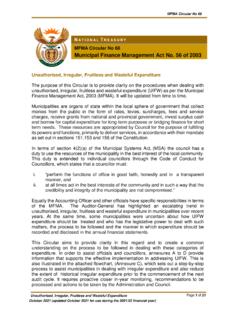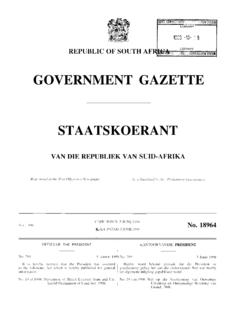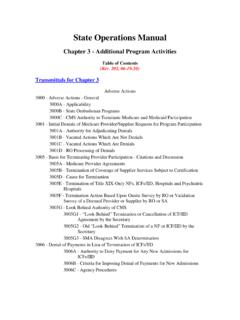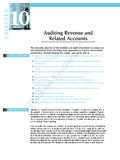Transcription of SCM REGULATION 32: PROCUREMENT OF GOODS OR …
1 NA T I O N A L TR E A S U R Y MFMA Circular No 96 Municipal Finance Management Act No. 56 of 2003 REGULATION 32 of the Municipal SCM Regulations July 2019 Page 1 of 6 SCM REGULATION 32: PROCUREMENT OF GOODS OR SERVICES UNDER CONTRACTS SECURED BY OTHER ORGANS OF STATE PURPOSE The purpose of this Circular is to provide further elaboration to municipalities and municipal entities on the principles captured in REGULATION 32 of the Municipal Supply Chain Management Regulations 2005 (SCM Regulations) when procuring GOODS or services from contracts secured by other organs of state. BACKGROUND Section 217(1) of the Constitution of the Republic of South Africa Act, 1996 states that:- When an organ of state in the national, provincial or local sphere of government, or any other institution identified in national legislation, contracts for GOODS or services, it must do so in accordance with a system which is fair, equitable, transparent, competitive and cost-effective.
2 REGULATION 32 states that: A supply chain management policy may allow the accounting officer to procure GOODS or services for the municipality or municipal entity under a contract secured by another organ of state, but only if- a) the contract has been secured by that other organ of state by means of a competitive bidding process applicable to that organ of state; b) the municipality or entity has no reason to believe that such contract was not validly procured; c) there are demonstrable discounts or benefits for the municipality or entity to do so; and d) that other organ of state and the service provider have consented to such PROCUREMENT in writing. Sub REGULATION (1) (c) and (d) do not apply if- a) a municipal entity procures GOODS or services through a contract secured by its parent municipality; or b) a municipality procures GOODS or services through a contract secured by a municipal entity of which it is the parent municipality.
3 Therefore, a municipality or municipal entity may dispense with the competitive bidding process in terms of REGULATION 32 of the Municipal SCM Regulations, provided that the municipality or municipal entity complies with the requirements stated above. The GOODS or services that were procured by the other organ of state are exactly the same in every respect MFMA Circular No 96 REGULATION 32 of the Municipal SCM Regulations July 2019 Page 2 of 6 including the terms and conditions as that required by the municipality or municipal entity. The municipality or municipal entity will rely on the open competitive bidding processes that the other organ of state undertook in appointing the service provider, thereby saving on administrative efforts and costs.
4 Over the years, there has been an increased use of contracts secured by other organs of state by municipalities and municipal entities. Whilst not prohibited by the SCM Regulations, we have observed an inconsistent application of the requirements as outlined in REGULATION 32. This has resulted in municipalities and municipal entities incurring irregular expenditure due to the non-compliance with the REGULATION . PRINCIPLES UNDERPINNING THE IMPLEMENTATION OF REGULATION 32 Before a municipality or municipal entity decides to become a participant in a contract secured by another organ of state, it must, as part of demand management, conduct a detailed analysis of the GOODS or services required.
5 When procuring infrastructure, the municipality or municipal entity must also compare for example its topography or other features, to that of the other organ of state in order to ensure that the service provider will be able to deliver at an acceptable standard. The contract must have been secured by means of a competitive bidding process applicable to that other organ of state and the municipality or entity has no reason to believe that such contract was not validly procured This means that the municipality or municipal entity that intends to use a contract secured by another organ of state must verify and satisfy itself that the contract was procured through a PROCUREMENT process that was fair, equitable, transparent, competitive and cost effective consistent with the public sector PROCUREMENT principles set out in section 217 of the Constitution.
6 In order to verify this, the municipality or municipal entity must obtain copies of the bid advertisements, bid documents, minutes of evaluation and adjudication committee meetings, and any other relevant documents relating to the contract in order to review whether the other organ of state complied with applicable legislation and policies when it procured the contract. The bid adjudication committee and the internal audit unit of the municipality or the municipal entity that is requesting to procure under the contract secured by the other organ of state must review the obtained documentation from the organ of state, to certify that a competitive bidding process and due process was followed by the other organ of state in concluding the contract.
7 The municipality or municipal entity must maintain confidentiality when processing all documentation, as may be appropriate. There must be demonstrable discounts or benefits for the municipality or entity to procure GOODS or services under a contract procured by another organ of state The municipality or municipal entity must assess the contract terms such as, unit of issue or type of service; delivery lead times and prices; length of contract in line with required GOODS or service; and undertake a comparative research to determine if this form of PROCUREMENT is more advantageous than advertising a competitive bid. This must include the determination MFMA Circular No 96 REGULATION 32 of the Municipal SCM Regulations July 2019 Page 3 of 6 of a reasonable price for the required GOODS or services; taking into consideration that the requesting municipality or municipal entity can only utilise the remaining portion of the contract that has not been utilised by the original contracting organ of state and not create an additional contract.
8 The value or price of the participating municipality or municipal entity s required GOODS or services must not exceed the value or price of the original contract. The decision to participate must be informed by a detailed report that outlines the outcome of the above-mentioned assessment, confirming the legal status of the contract with the other organ of state, reasons for why the municipality or municipal entity could not arrange its own contract through a competitive bidding process; and set out the value the participation will bring to the participating municipality or municipal entity. The detailed report mentioned above must be submitted to the participating municipality or municipal entity s bid adjudication committee for its consideration and recommendation to the accounting officer or delegated official, in terms of the municipality or municipal entity s delegation policy.
9 Prior to the recommendation of the bid adjudication committee being submitted to the accounting officer or delegated official, it must be submitted to its internal audit unit to provide further assurance that the requirements as outlined in REGULATION 32 have been complied with, and thereafter submitted to the accounting officer or delegated official for his/her consideration and final approval of the participation. The other organ of state and the service provider have consented to such PROCUREMENT in writing The accounting officer requesting to participate must first obtain written consent from the other organ of state as well as confirmation of the supplier s contractual performance.
10 Once the accounting officer requesting for participation has obtained consent to procure under the contract and confirmation of the supplier s performance from the other organ of state; and has performed all internal due diligence checks, including ensuring compliance with the salient points listed below, may the accounting officer solicit the service provider s written consent. Failure to obtain this written consent by the accounting officer requesting to procure under the contract secured by another organ of state will be construed as non-compliance with the regulations and associated expenditure being irregular expenditure. SALIENT REQUIREMENTS APPLICABLE TO REGULATION 32 Over and above the requirements stated in REGULATION 32, there are also other salient requirements which must be considered by the participating municipality or municipal entity as well as the organ of state that is approving the PROCUREMENT under its contract.














